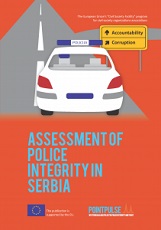2015 ASSESSMENT OF POLICE INTEGRITY IN SERBIA
2015 ASSESSMENT OF POLICE INTEGRITY IN SERBIA
Author(s): Alisa Koljenšić Radić
Subject(s): Politics, Security and defense, Corruption - Transparency - Anti-Corruption
Published by: BCBP Beogradski centar za bezbednosnu politiku
Keywords: police integrity; Serbia; police sector; corruption
Summary/Abstract: The integrity of the police in Serbia has been compromised. Only four percent of Serbian citizens believe that there is no corruption in the police force. The fight against corruption in the police became a “target” of the European Commission because the police has been identified in the Screening Report for Chapter 23: Judiciary and Fundamental Rights as a particularly sensitive area when it comes to corruption. Only one out of 23 Anti-Corruption Strategy activities listed in the Action Plan under section “Police” was implemented in full and within the set deadline. All this indicates the presence of a problem of accountable policing. Ministry of Interior has recognized the problem of compromised integrity of the police, and that is good. New strategic MoI priorities have been established: strengthening the accountability of the police and the internal control mechanisms to suppress corruption in police ranks. Consequently, the police reform in 2015 was marked by (i) drafting the new Law on Police, which will introduce new anti-corruption measures such as verification of the property of police officers in leading positions, and (ii) the establishment of an effective human resources management system in the MoI. The seriousness of this job may also be gleaned from the fact that adoption of the new Law on Police had been proposed three times already during this year, and that the new Human Resources Sector, as the main proponent of reform in this area, has yet to become operational even though changes in the human resources management had begun four years ago. This Report presents the results of monitoring the integrity of the police service in Serbia. Research indicates whether and to what extent the MoI and the police are behaving responsibly, i.e. whether the established strategic objectives and statutory functions are implemented in practice. The study offers an analysis of the integrity of the police using specific methodology for assessing the integrity of the police in six areas in which legal and practical weaknesses that may jeopardize such integrity have been examined: the transparency of police work, the influence of political interests on the operational work of the police, human resources management, financial management, internal control and external oversight of police work. Special emphasis was placed in the Report on the analysis of the solutions contained in the Draft Law on Police
Series: BCBP - Assessment of Police Integrity
- Page Count: 52
- Publication Year: 2015
- Language: English
- Content File-PDF

